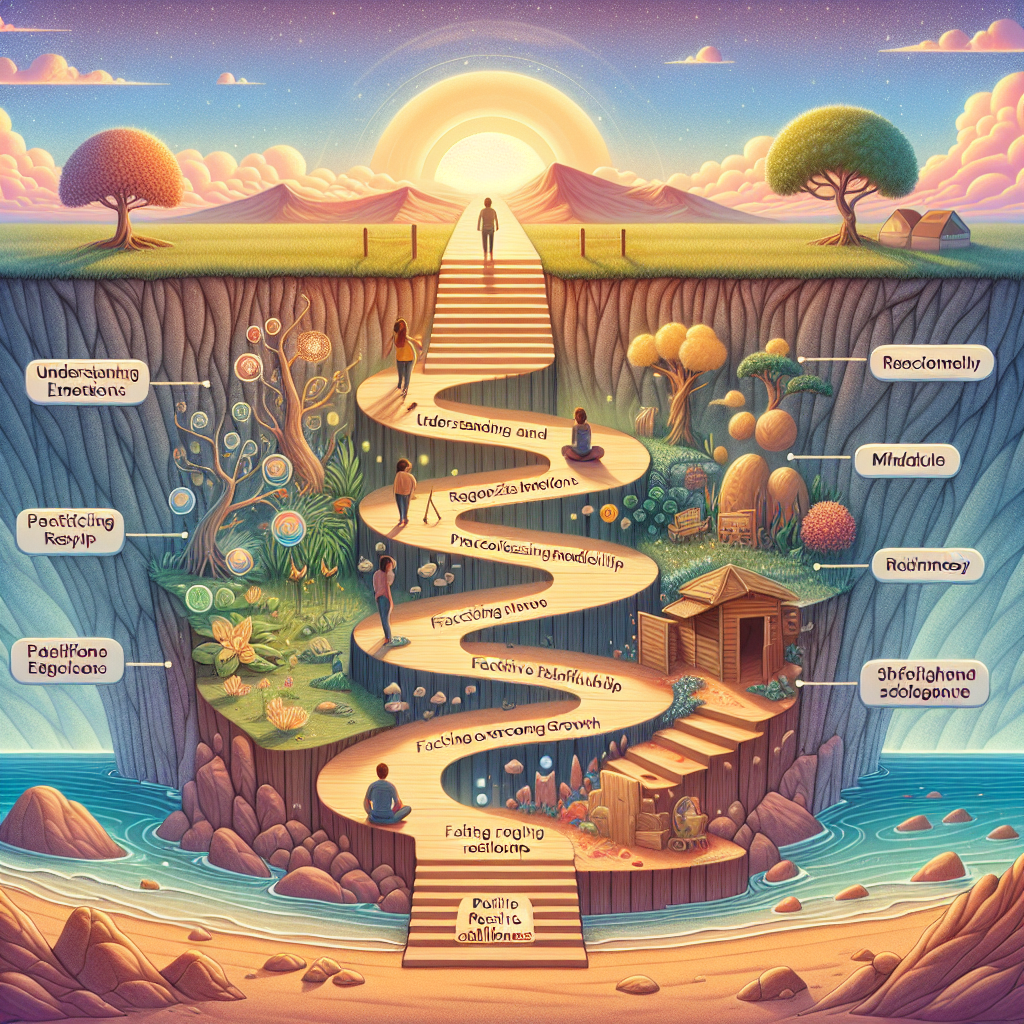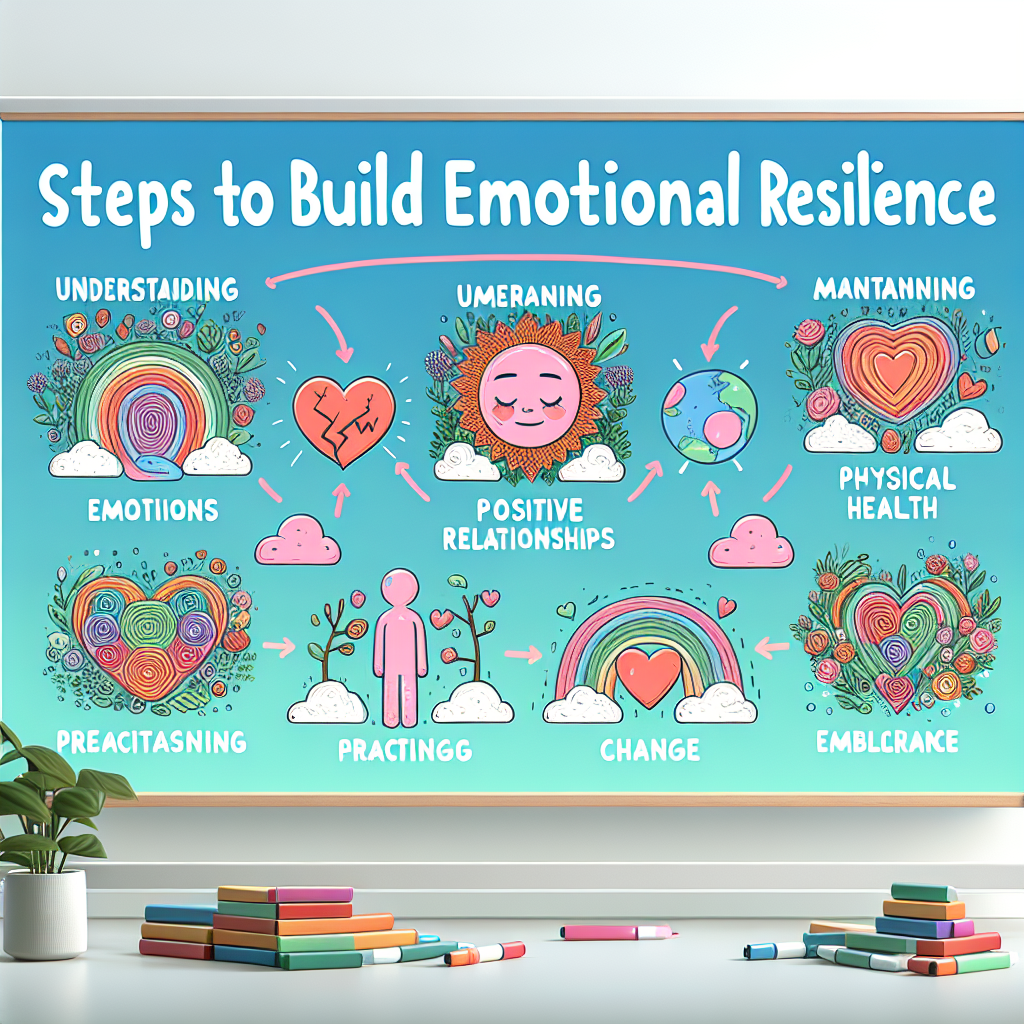How to Build Emotional Resilience

Start building your emotional resilience today! Learn the essential steps and strategies at My Vibrant Vitality. Don’t wait, empower yourself now!
Strategies for Building Emotional Resilience: A Comprehensive Guide
Emotional resilience is the ability to adapt to stressful situations or crises. It’s the mental fortitude to bounce back from adversity, trauma, tragedy, threats, or significant sources of stress. Building emotional resilience doesn’t eliminate the strains and pressures of life, but it can help you develop mechanisms to protect yourself and manage the challenges that come your way.
The first strategy to build emotional resilience is to cultivate a positive self-image. Your perception of yourself plays a crucial role in how you react to life’s challenges. If you view yourself as capable and strong, you’re more likely to take on difficulties with a positive attitude. This doesn’t mean ignoring your weaknesses, but rather acknowledging them and focusing on your strengths.
Another strategy is to maintain a positive outlook. This doesn’t mean ignoring the reality of a situation, but rather choosing to focus on the good rather than the bad. It’s about finding the silver lining in every cloud, no matter how dark. This perspective can help you to see problems as opportunities for growth rather than insurmountable obstacles.
Building strong, supportive relationships is also key to emotional resilience. Having a network of friends and family who you can turn to in times of need can provide a buffer against life’s stressors. These relationships can provide emotional support, offer advice, and help you see things from a different perspective.
Practicing good self-care habits is another important strategy. This includes eating a healthy diet, getting regular exercise, ensuring you get enough sleep, and taking time each day to relax and recharge. When you’re physically healthy, you’re better equipped to handle emotional challenges.
Mindfulness and meditation can also be beneficial. These practices can help you stay focused on the present moment, rather than worrying about the future or dwelling on the past. They can also help you develop a greater awareness of your own thoughts and feelings, which can in turn help you manage them more effectively.
Building emotional resilience is a process, and it’s important to be patient with yourself. It’s also important to remember that it’s okay to ask for help. If you’re struggling to cope with a particular situation, don’t hesitate to seek professional help. Therapists and counselors are trained to help you develop strategies to manage stress and build emotional resilience.
In conclusion, building emotional resilience is about developing a positive self-image, maintaining a positive outlook, building strong relationships, practicing good self-care, and being mindful. It’s about learning to adapt to change, to bounce back from adversity, and to keep going, even when things are tough. It’s a lifelong journey, but one that can lead to greater happiness, success, and fulfillment.
Mastering Emotional Resilience: Techniques and Tips

Emotional resilience is a critical skill that allows individuals to adapt to stressful situations or crises. It is the ability to bounce back from adversity, trauma, tragedy, threats, or significant sources of stress. Building emotional resilience doesn’t mean that a person won’t experience difficulty or distress, but it can change the way one responds to these challenges, reducing the toll they take on one’s mental health.
To begin with, it’s important to understand that emotional resilience is not a trait that people either have or do not have. It involves behaviors, thoughts, and actions that anyone can learn and develop. The ability to become emotionally resilient can vary dramatically among individuals, but it can be nurtured and developed with time and patience.
One of the most effective ways to build emotional resilience is through self-care. This involves taking care of your physical health by eating a balanced diet, getting regular exercise, ensuring you get enough sleep, and avoiding harmful habits like excessive alcohol consumption or smoking. Physical health plays a significant role in our emotional resilience as it directly impacts our mood and energy levels.
Another crucial aspect of building emotional resilience is developing strong, supportive relationships. Having a network of supportive friends, family, and colleagues can provide a buffer against life’s stressors. It’s essential to cultivate relationships that provide encouragement and reassurance, and to seek professional help when necessary.
Mindfulness and meditation are also powerful tools for building emotional resilience. These practices can help you stay focused on the present moment, reducing anxiety about the future or rumination on the past. They can also help you develop a greater awareness of your emotional state, allowing you to better manage your emotions and respond to stress more effectively.
Building emotional resilience also involves changing the way you perceive and respond to stressful situations. This can be achieved by practicing cognitive restructuring, a technique that involves identifying and challenging negative thought patterns. By learning to recognize when you’re falling into these patterns, you can start to shift your thinking towards a more balanced, realistic perspective.
Another technique is to practice emotional regulation, which involves understanding and managing your emotions. This can be done by learning to identify what you’re feeling, why you’re feeling it, and how you can respond to these emotions in a healthy, constructive way.
Building emotional resilience is a journey that takes time and practice. It’s important to remember that it’s okay to have bad days and to experience negative emotions. What matters is how you respond to these feelings and situations. By practicing self-care, cultivating supportive relationships, practicing mindfulness and meditation, and learning to manage your emotions, you can build emotional resilience and navigate life’s challenges with greater ease and confidence.
In conclusion, emotional resilience is not an innate trait but a skill that can be developed and strengthened over time. It’s about learning to ride the wave of life’s ups and downs, rather than trying to avoid them. By mastering emotional resilience, you can not only survive life’s challenges but thrive in the face of them.
The Role of Emotional Resilience in Personal Growth and Success
Emotional resilience is a critical aspect of personal growth and success. It is the ability to adapt to stressful situations or crises, and more importantly, to bounce back from them. It is a trait that allows us to maintain our mental health and well-being in the face of adversity. Emotional resilience is not something we are born with, but rather, it is a skill that we can develop and strengthen over time.
The role of emotional resilience in personal growth cannot be overstated. It is the foundation upon which we build our ability to manage stress, overcome challenges, and navigate through life’s ups and downs. When we are emotionally resilient, we are better equipped to handle the pressures of daily life, and we are more likely to achieve our goals and aspirations.
Emotional resilience is also closely linked to success. It is a key factor in our ability to persevere, to stay focused, and to keep going even when things get tough. It helps us to maintain a positive outlook, to see the bigger picture, and to stay motivated. It is the driving force that propels us forward, even in the face of adversity.
Building emotional resilience involves several key steps. First and foremost, it requires self-awareness. We need to understand our emotions, to recognize our triggers, and to identify our stressors. This self-awareness allows us to manage our emotions more effectively, and to respond to stress in a healthier way.
Secondly, building emotional resilience involves developing coping strategies. These strategies can include things like mindfulness, meditation, exercise, and other forms of self-care. They help us to manage our stress levels, to stay calm under pressure, and to maintain our mental health.
Thirdly, building emotional resilience involves fostering positive relationships. These relationships provide us with a support network, they help us to feel connected, and they provide us with a sense of belonging. They also provide us with a sounding board, a place to vent, and a source of advice and guidance.
Finally, building emotional resilience involves cultivating a positive mindset. This involves focusing on the positive, practicing gratitude, and maintaining a hopeful outlook. It also involves reframing negative thoughts, challenging negative beliefs, and replacing them with more positive and empowering ones.
In conclusion, emotional resilience plays a pivotal role in personal growth and success. It is a skill that can be developed and strengthened over time, and it is a trait that can significantly enhance our ability to manage stress, overcome challenges, and achieve our goals. By building emotional resilience, we can improve our mental health, enhance our well-being, and set ourselves up for success. So, let’s start building our emotional resilience today, and let’s set ourselves on the path to personal growth and success.